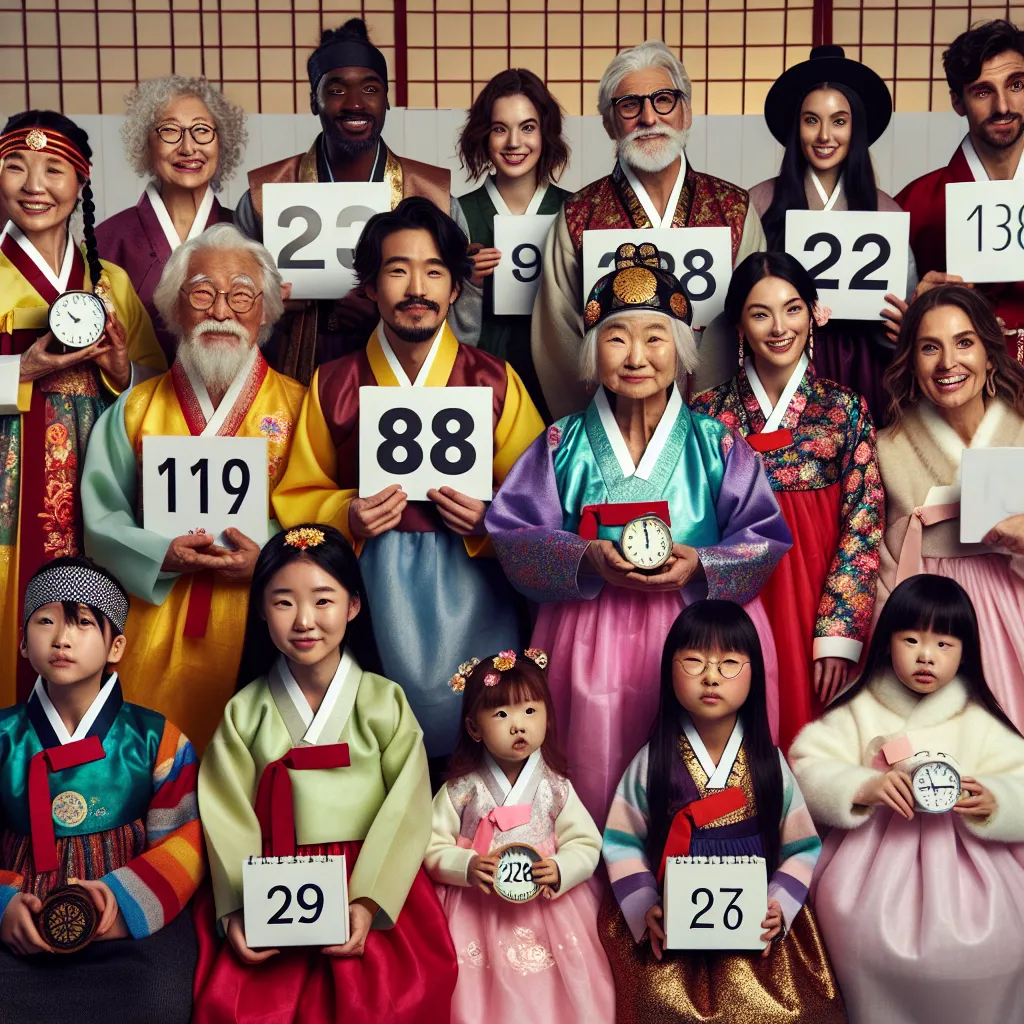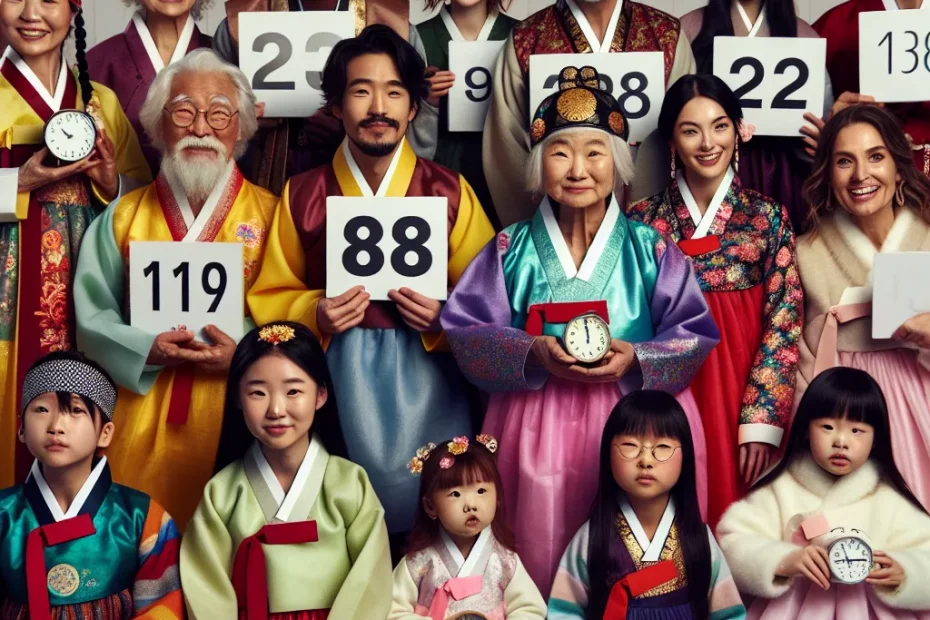Korean age, a unique way of counting years, offers an intriguing perspective on age calculation. In Korean culture, individuals are considered one year old at birth and gain an additional year when the new year begins. This method often leads to a gap of one or two years compared to the international age system. Understanding this concept is essential for anyone interacting with Koreans or interested in Korean culture. Calculating Korean age requires a simple adjustment based on both the lunar and solar calendars. This difference in age calculation holds significant cultural importance in various aspects of Korean society, from social interactions to legal matters. Embracing the Korean age system provides valuable insights into the cultural nuances and traditions of this vibrant society.

What is Korean Age?
In South Korea, age is calculated in a unique way that differs from the common international practice. Known as “Korean age,” this system adds one year to a person’s age on New Year’s Day, regardless of their actual birthdate. This means that a baby is considered one year old at birth, and everyone’s age increases by one year on January 1st, rather than on their individual birthdays.
Understanding Korean Age
Understanding Korean age is essential when interacting with Koreans, as it plays a significant role in social relationships and etiquette. For example, in Korean culture, it is common to address others using honorifics based on age, so knowing someone’s Korean age is crucial for showing respect.
Calculating Korean Age
To calculate your Korean age, you simply add one or two years (depending on the month you were born) to your international age. For instance, if you were born in Korea on December 31st, you would be considered two years old on January 1st, even though you may only be a few hours old by international standards.
Unique Age Calculation System
This unique age calculation system stems from the traditional Korean belief that a baby is already one year old at birth, as they have spent nine months in the womb. This cultural perspective on age reflects the emphasis on community and interconnectedness in Korean society.
Celebrating Birthdays in Korea
Celebrating birthdays in Korea is still important, but Korean age is often used in formal settings and legal documents. It can sometimes lead to confusion for those unfamiliar with the system, but it is an integral part of Korean culture and identity.
So, the next time you meet someone from Korea, remember to take their Korean age into account and show respect according to their cultural norms. Understanding and acknowledging Korean age is a small yet meaningful way to bridge cultural differences and foster deeper connections with people from this vibrant and dynamic country.
Let’s embrace the uniqueness of Korean age and appreciate the rich cultural tapestry it adds to our global society! 🇰🇷🎊
Understanding the concept of Korean Age
In Korea, age is calculated in a unique way that may seem confusing to those unfamiliar with the system. When a baby is born in Korea, they are automatically considered to be one year old. This is because the time spent in the mother’s womb is counted as the first year of life. Additionally, everyone’s age increases by one year on January 1st, regardless of their actual birthday. This means that even if you were born on December 31st, you would still be considered two years old on January 1st of the following year.
The Difference in Age Calculation
This method of age calculation often leads to a difference of one or two years between someone’s Korean age and their international age. For example, a person who was born in December 1990 would be considered 31 years old in Korean age in 2021, but only 30 years old in international age until their birthday in December.
Understanding Korean age is essential in Korean culture as it determines how individuals address each other and their social hierarchy. Younger individuals are expected to show respect to their elders, and age plays a significant role in determining social dynamics.
So, the next time you meet someone from Korea and they mention their age, remember to consider both their Korean age and international age to fully understand their perspective and cultural background! 🇰🇷✨
In conclusion, Korean age is a fascinating aspect of Korean culture that reflects the importance of respect for elders and social hierarchy. By grasping the concept of Korean age, you can deepen your understanding of Korean society and foster meaningful connections with individuals from this vibrant and unique culture! 🌟
Calculating Korean Age
In Korea, age is calculated quite differently compared to many other parts of the world. When a baby is born, they are considered to be one year old, and they gain an additional year on New Year’s Day rather than on their birthday. This unique way of counting age can sometimes lead to confusion for those unfamiliar with the Korean age system.
To calculate someone’s Korean age
you need to consider both the year of their birth and the current year. For example, if a person was born in 1990 and it is currently 2022, their Korean age would be 33, not 32 as it would be in many other countries. This is because they are already considered to be one year old at birth, and they gain an extra year on New Year’s Day.
Understanding Korean age is essential in Korean culture, as it determines how individuals address each other and is a crucial factor in various social interactions. It is not just a matter of simple arithmetic; it reflects the cultural values and traditions deeply rooted in Korean society.
So, the next time you meet someone from Korea and want to know their age, remember to calculate their Korean age to ensure accurate and respectful communication. It’s a small but significant detail that can make a big difference in your interactions with Korean individuals. 🇰🇷✨
In conclusion, Korean age may seem complex at first, but once you grasp the concept, it adds an intriguing layer to understanding Korean culture and societal norms. Embracing and respecting this unique way of counting age is a great way to show appreciation for the rich heritage and customs of Korea. 🌟🎎
Significance of Korean Age
In South Korea, age is not just a number; it holds a significant cultural and social importance. Understanding Korean age is crucial in various aspects of life, from relationships to education and even job opportunities.
Korean Age Calculation
Korean age, also known as “만 나이 (man-nai),” is calculated differently from the international age system. In Korea, when a baby is born, they are automatically considered one year old, and everyone gains a year on New Year’s Day rather than on their birthday. This unique way of counting age can sometimes lead to confusion for those unfamiliar with the system.
Significance in Social Interactions
The significance of Korean age becomes apparent in social interactions, especially when addressing someone older. Respect for elders is deeply ingrained in Korean culture, and age plays a vital role in determining hierarchies and relationships. Using the appropriate honorifics and speech levels based on age is essential in Korean society.
Impact on Milestones
Moreover, Korean age affects various milestones in life, such as starting school or entering the workforce. For example, in Korea, children typically begin elementary school at the age of six, but depending on their birthdate, they might be considered a year older in Korean age, impacting their academic and social development.
Professional World
In the professional world, Korean age can influence job prospects and promotions. Employers often consider age along with qualifications and experience when making hiring decisions. This emphasis on age reflects the value placed on seniority and experience in Korean workplaces.
Overall, Korean age is more than just a numerical value; it is a reflection of cultural norms, respect, and societal expectations. Understanding and respecting the significance of Korean age is essential for navigating various aspects of life in South Korea. 🇰🇷✨
Korean age, a unique way of counting years, holds a significant cultural value in South Korea. Understanding this concept not only provides insight into Korean culture but also fosters cross-cultural appreciation. By calculating Korean age, individuals can navigate social interactions more effectively and show respect for Korean traditions. Embracing the Korean age system showcases a willingness to learn and adapt to different cultural norms, promoting harmony and understanding in a diverse society. In a globalized world, acknowledging and respecting such cultural nuances is crucial for building connections and fostering mutual respect among people from various backgrounds.
